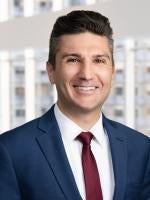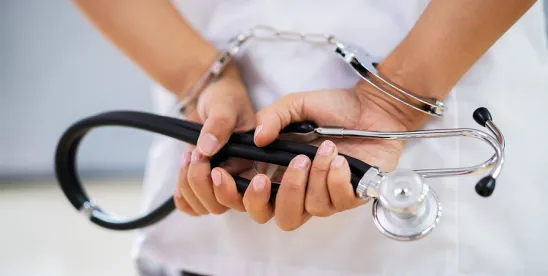On June 30, 2025, the U.S. Department of Justice (“DOJ”), together with the U.S. Department of Health and Human Services Office of Inspector General (“HHS OIG”) and other law enforcement partners, announced the results of the 2025 National Health Care Fraud Takedown—hailed as the largest in history.
This year, DOJ’s Health Care Fraud Unit reported that 324 defendants were charged for their alleged involvement in various health care fraud schemes that involved over $14.6 billion in intended loss—more than doubling the prior record of $6 billion set in 2020 during the first Trump administration. By way of comparison, last year, the 2024 Takedown charged 193 defendants with allegedly committing more than $2.5 billion in fraud. And two years ago, the 2023 Takedown charged 78 defendants with more than $2.5 billion. To say there was a significant increase between the Biden administration and the second Trump administration would be an understatement.
That this administration would “follow the money” should not come as a surprise. As noted, the prior record was set during President Trump’s first term in 2020. In that Takedown, DOJ and HHS OIG reported 345 defendants allegedly submitted more than $6 billion in false and fraudulent claims to federal health care programs and private payers. The bulk of that 2020 Takedown, $4.5 billion, was related to telehealth.
A repeated message of DOJ in the second Trump administration has been targeting fraud, waste, and abuse in health care. As Matthew Galiotti, head of the DOJ’s criminal division said, “Today’s enforcement action represents the largest healthcare fraud takedown in American history but it’s not the end…It’s the beginning of a new era of aggressive prosecution and data-driven prevention.”
In connection with the Takedown, Galiotti also announced a new collaboration between the Federal Bureau of Investigation (“FBI”), HHS OIG, and other federal agencies to create a Health Care Data Fusion Center (“Fusion Center”) aimed at revolutionizing the detection, investigation, and prosecution of health care fraud. Led by the DOJ’s Health Care Fraud Unit and comprised of data specialists from the unit's data analytics team, the Fusion Center “will break down information silos using coordinated data analysis, to enable our investigative teams to quickly identify and dismantle emerging fraud schemes.”
Health care companies have effectively been put on notice that the industry will continue to be a top enforcement priority for federal law enforcement efforts, so we expect to see similar figures over the course of the coming years. Furthermore, as DOJ increasingly relies on data analytics, we expect to see many investigations predicated upon health care providers who are billing outliers.
What Has Stayed the Same and What Has Changed?
In the second Trump administration, the 2025 DOJ is back to calling this a “takedown”—as opposed to an “enforcement action,” a Biden-era term. Whether this terminology change is due to its aggressive connotations or not, the scope of the takedown cannot be denied.
The 2025 Takedown operated on a global scale, with 29 defendants in transnational criminal organizations alleged to have submitted more than $12 billion in fraudulent claims to U.S. health insurance programs. Charges against 19 defendants stemmed from an investigation called Operation Gold Rush—a network of foreign straw owners who allegedly bought U.S. medical supply companies; submitted $10.6 billion in fraudulent claims to Medicare (using the stolen identities of U.S. citizens); and laundered the proceeds. Another foreign scheme involved five defendants who allegedly used artificial intelligence (“AI”) to create fake recordings of Medicare beneficiaries consenting to products and services.
As has been the case in the past, the health care fraud enforcement efforts in 2025 led to the seizure of many assets, including more than $245 million in cash, luxury vehicles and cryptocurrency. Interestingly, despite the massive increase in intended loss, this seizure is on a par with 2024, where the government reportedly seized $231 million worth of cash, cars, and gold.
One of the more interesting aspects to this year’s takedown is the inclusion of civil enforcement actions. The 2025 Takedown includes civil charges against 20 defendants for $14.2 million in alleged fraud and civil settlements with 106 defendants totaling $34.3 million. While the approximately $50 million in civil recoveries pales in comparison to the intended loss figure from the criminal enforcement, these are monies that the government either has or will likely recoup. As we have previously noted, civil cases typically involve larger corporations and more substantial financial recoveries than criminal enforcement. It is possible that emphasis on civil recoveries will become standard in future takedowns.
As for the Fusion Center, while it may be new, the Health Care Fraud Unit has been using data analytics for more than 15 years. Crunching data allows it to try to keep pace with constantly evolving fraud schemes: “Although health care fraud enforcement is necessarily reactive (and not proactive), DOJ hopes that its increasing use of data analytics will help it break the cycle of ‘pay and chase.’”
Types of Cases in this Year’s “Takedown”
This year’s Takedown is grouped into four categories of cases, down from six in 2024, although the topics remain largely the same. The 2025 cases involved:
Fraudulent wound care. The DOJ announced eight different cases involving various wound care schemes, including one case that involved seven defendants, five of whom are medical professionals, that were charged in connection with approximately $1.1 billion in allegedly fraudulent claims to Medicare and other health care benefit programs.
Prescription opioid trafficking. Seventy-four defendants, including 44 medical professionals, were charged in 58 cases for the alleged diversion of more than 15 million pills of prescription opioids and other controlled substances. Within the past six months, the Drug Enforcement Administration (“DEA”) has charged 93 administrative cases relating to the revocation of the authority to handle and/or prescribe controlled substances.
Telemedicine and genetic testing fraud. Forty-nine defendants were charged with allegedly submitting $1.17 billion in fraudulent claims to Medicare resulting from telemedicine and genetic testing. Importantly, DOJ noted that it will continue to focus on fraudulent claims related to genetic testing, durable medical equipment and COVID-19 tests, all of which have been of interest to the DOJ for at least the past five years—see, e.g., Operation Brace Yourself and Operation Double Helix.
Other health fraud schemes. One hundred seventy defendants were charged with more than $1.84 billion in allegedly false and fraudulent claims to Medicare, Medicaid, and private insurance companies regarding treatments and services that were medically unnecessary, not provided at all, or provided in connection with kickbacks and bribes.
‘Largest Target of All’
In addition to HHS OIG and the FBI, the DOJ partnered with CMS, DEA, and other enforcement agencies, including Medicaid Fraud Control Units (“MFCUs”) (see EBG’s recent blog post) for the 2025 Takedown.
As CMS Administrator Dr. Mehmet Oz noted, CMS is “probably the largest target of all, responsible for about $ 1.7 trillion dollars of disbursements.” CMS further announced on June 30 that it has successfully prevented more than $4 billion from being paid—and had suspended or revoked the billing privileges of 205 providers in the months leading up to the 2025 Takedown.
“They can pierce the veil of protection by just getting identifier numbers from our seniors or Medicaid recipients or others and thus use those tools…to hurt us,” Oz said. “What we’re doing today is changing the paradigm—not just going after bad guys and putting them behind bars but actually getting ahead of these schemes so the money never leaves our bank account.”
Takeaways
As always, these kinds of enforcement actions remind those who are involved in health care— whether as a practitioner, in the C-Suite, or elsewhere in the field—that appropriate compliance programs and general oversight remain critical. The 2025 Takedown confirms, however, that now more than ever, DOJ under Attorney General Pam Bondi will be aggressively focused on investigating, prosecuting, and preventing health care fraud, whether to address patient harm, stem the opioid epidemic and/or return money to government coffers—as President Trump and the agency have consistently said that they would.
We will continue to monitor these annual enforcement actions and other developments in this space.
Chart of Cases Filed in Federal and State Court
(Alphabetical by State)
| Federal Court | # of Cases | Examples of Allegations |
| District of Arizona | 5 | Health care fraud, wire fraud, and money laundering; kickbacks |
| Central District of California | 5 | Hospice fraud; Medicaid fraud; kickbacks |
| Northern District of California | 5 | Controlled substances; claims to Medicare Advantage (MA) for unnecessary durable medical equipment (DME); money laundering from federal COVID-19 relief program; telemedicine fraud; false claims to federal programs for office visits that never occurred |
| Southern District of California | 1 | Unlawful payments to induce referrals |
| District of Connecticut | 1 | Unlawful distribution of controlled substances |
| District of Columbia | 6 | Overlapping billing scheme; health care fraud, wire fraud, mail fraud, identity theft, kickbacks; fraudulent medical paperwork |
| District of Delaware | 2 | Civil False Claims Act (FCA) telemedicine fraud scheme involving genetic testing and DME; FCA medically unnecessary genetic lab tests |
| Middle District of Florida | 7 | Kickback scheme to provide doctors' orders to pharmacies, DME companies, and laboratories; kickbacks to companies connected to telemedicine doctors; medically unnecessary prescription medication, DME, and lab tests |
| Northern District of Florida | 1 | Conspiracy to distribute and dispense controlled substances; distribution; identity theft in connection with unlawfully diverting controlled substances |
| Southern District of Florida | 27 | Exploiting 340B Program with prescription mills; kickbacks; falsifying dispensing records; medically unnecessary or not provided DME, genetic testing, prescription drugs, telemedicine, wound products, OTC COVID-19 tests; conspiracy to sell fake nursing diplomas and transcripts, Medicare beneficiary identifier numbers; distributing controlled substances; defrauding financial institutions through cosmetic surgery/devices not provided; |
| Middle District of Georgia | 1 | DME never ordered/supplied; illegally obtained identification numbers |
| Northern District of Illinois | 5 | Schemes to defraud HRSA COVID-19 Uninsured Program; COVID-19, DME, genetic tests never requested/received; kickbacks, HIPAA violations, money laundering; misbranding of foreign-sourced drugs |
| District of Idaho | 1 | Medically unnecessary streptococcus and influenza tests; exaggerated billing protocols during COVID-19 pandemic |
| Eastern District of Kentucky | 1 | Drugs not purchased or dispensed; billing for brand name drugs when generics dispensed; billing for more expensive generics when cheaper ones dispensed |
| Western District of Kentucky | 3 | Veterinarian conspiracy to use illegal DEA number and to obtain controlled substances through false names of deceased or fictitious canines; theft of medical products and controlled substances |
| Eastern District of Louisiana | 4 | Embezzling funds from a nonprofit receiving grants from HHS; medically unnecessary genetic testing; kickbacks; COVID-19 tests not requested; medically unnecessary genetic testing; kickbacks |
| Middle District of Louisiana | 2 | Paycheck Protection Program (PPP) schemes |
| District of Maine | 1 | ID theft, false statements relating to health care, unlawful use of SNAP benefits |
| District of Massachusetts | 1 | Medically unnecessary DME; kickbacks |
| Eastern District of Michigan | 6 | Conspiracy to distribute/distribution of controlled substances; civil FCA for prescription drugs billed, never dispensed, and nonexistent/substandard services to nursing home residents; medically unnecessary home health services; pharmacy owner's fraudulent billing for medications that were medically unnecessary, never dispensed, and/or never prescribed |
| Western District of Michigan | 1 | Dental services not rendered |
| Northern District of Mississippi | 1 | Pharmacists billing for same prescription drugs multiple times with return scheme |
| Southern District of Mississippi | 2 | Unnecessary DME, diagnostic testing, and PPP schemes; kickbacks |
| District of Montana | 2 | Fraud involving federal benefits including Social Security disability and Medicaid |
| District of Nevada | 2 | Kickbacks for amniotic wound allografts |
| District of New Hampshire | 2 | Fraud involving psychotherapy treatment and telehealth; medically unnecessary DME |
| District of New Jersey | 11 | Conspiracy to distribute controlled substances in connection with opioids; drugs never dispensed to beneficiaries; kickbacks for lab tests and DME; high-reimbursement drugs never dispensed by pharmacy; medically unnecessary services/treatment; fraudulent dental services |
| Eastern District of New York | 5 | Operation Gold Rush (purchase of DME companies to submit billions in false claims and money laundering); conspiracy to distribute/distribution of narcotics; pharmacy fraud with drugs not dispensed; kickbacks; medically unnecessary DME |
| Northern District of New York | 3 | Psychotherapy services never provided; distributing/dispensing controlled substances; impermissible use of provider relief funds; false/inaccurate Medicare cost reports by skilled nursing facilities; false claims to TRICARE and Medicaid by altering compounded medications |
| Southern District of New York | 2 | COVID-19 testing and other services never provided; fraudulent prescriptions using stolen identities of practitioners and patients |
| Western District of New York | 3 | Fraudulent telehealth; criminal, civil FCA for medically unnecessary DME; distributing/dispensing controlled substances |
| Eastern District of North Carolina | 2 | Kickbacks; medically unnecessary DME |
| Western District of North Carolina | 2 | Medically unnecessary/not performed drug tests; purchasing/selling Medicaid numbers; money laundering; behavioral services not provided |
| District of North Dakota | 1 | Nonmedical emergency transport services, PPP loan |
| Northern District of Ohio | 1 | DME telemedicine scheme |
| Southern District of Ohio | 1 | Continued operation of substance abuse treatment facility after exclusion; counseling services improper or not provided |
| Northern District of Oklahoma | 1 | Conspiracy to distribute/prescribe controlled substance |
| Western District of Oklahoma | 1 | Nonexistent/partial visits in skilled nursing facilities |
| District of Oregon | 1 | Kickbacks/bribes for medically unnecessary braces |
| Eastern District of Pennsylvania | 1 | Kickbacks to refer home care patients to home care agencies; home care services never provided |
| District of South Carolina | 2 | Unauthorized/never delivered DME; therapy services to veterans never/improperly rendered |
| Middle District of Tennessee | 1 | Inpatient hospital/physician services never provided |
| Western District of Tennessee | 1 | Prescription medications never dispensed |
| Northern District of Texas | 4 | Physical therapy and devices not medically necessary/not provided/improper; kickbacks for OTC COVID-19 and EEG tests not requested or necessary; genetic testing never requested, ordered, and/or performed |
| Southern District of Texas | 21 | Kickbacks for medically unnecessary genetic and diagnostic tests; fraudulent hospice services; conspiracy to distribute/dispense controlled substances; skin substitutes; mental health therapy; DME and COVID-19 tests; COVID-19 diagnosis and treatment consultations; medically unnecessary footbath drugs |
| Western District of Texas | 1 | Kickbacks for medically unnecessary/ineligible hospice services |
| District of Vermont | 3 | Medically unnecessary/never provided DME; pharmaceutical company shipping controlled substances and misbranded pharmaceutical drugs |
| Eastern District of Virginia | 6 | Overbilling for environmental modifications; advertising and false billing for unapproved devices; medically unnecessary/not provided products and services; criminal tampering with drugs; fraudulent billing for residential group home services |
| Western District of Washington | 2 | Billing for unapproved product; obtaining controlled substances |
| Northern District of West Virginia | 1 | Kickbacks; false claims to Medicare for DME, devices, cancer testing, foot bath medications |
| State Court | # of Cases | Examples of Allegations |
| California | 8 | Patients not qualifying for hospice services; theft in connection with in-home services; prescribing/furnishing controlled substances; dependent adult abuse/assault with a deadly weapon |
| Illinois | 4 | Unlawful acquisition/possession of controlled substance; forgery/practicing nursing without license; fraudulent home services |
| Indiana | 12 | Obtaining controlled substances and possessing narcotics; fraud by home health aides |
| Louisiana | 6 | Intentionally/criminally negligent mistreatment/neglect at residential facilities; false claims for behavioral health, home care and personal care services |
| Massachusetts | 1 | Scheme to steal funds from personal care assistants |
| Michigan | 2 | Telephone/management/medical services not provided |
| Missouri | 9 | Personal care services never provided; misrepresentation of qualifications for mental health services; assault |
| New York | 20 | Civil settlement by Medicaid transportation companies for services never provided/inflated tolls; kickbacks; falsifying business records for home health hours; nurse's aide stealing from patient |
| Ohio | 12 | Services not provided |
| Pennsylvania | 2 | Services not provided; inappropriate sexual contact with patient |
| South Carolina | 1 | Money laundering; exploitation of vulnerable adult/resident of health care facility |
| Wisconsin | 1 | Psychotherapy sessions that never took place |
Epstein Becker Green Staff Attorney Ann W. Parks contributed to the preparation of this post.





 />i
/>i
